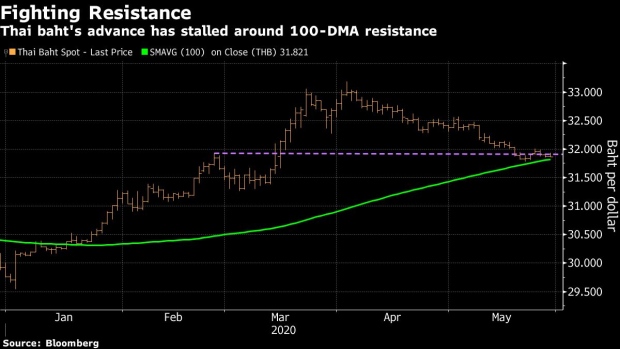May 31, 2020
Thai Baht’s Dramatic Rebound Looks Set to Fizzle on Growth Focus
, Bloomberg News

(Bloomberg) -- The Thai baht’s reign as one of Asia’s top performers may be short-lived as the central bank may curb gains to stimulate an economy on course for its worst contraction in more than two decades.
After lagging its peers for most of the year, the baht rose 1.8% to 31.81 per dollar in May in it’s biggest monthly gain in almost a year as the nation started loosening its lockdown restrictions.
The Bank of Thailand expressed concern on May 20 that the baht’s strength could impact economic recovery. The government has started loosening a lockdown, though incoming flights are still banned for the tourism-dependent economy.
“We are wary that the pace of any recovery could disappoint,” says Irene Cheung, foreign exchange strategist at Australia and New Zealand Banking Group Limited. She sees the baht weakening to 33.50 per dollar by end-June.
The baht’s rally may also face headwinds from technical factors. The currency breached resistance around 32.00 per dollar but further gains have been limited by its 100-day moving average. Slow stochastics, a momentum indicator, also shows that the baht is in the overbought territory.
Deficits are likely to sustain as a drag on the currency, given Thailand’s tourism industry isn’t expected to turn around any time soon with arrivals estimated to drop about 70% to 12.7 million this year.
The nation received no foreign tourists in April after closing its borders to fight the coronavirus outbreak, with flights banned through June 30. Tourism accounted for about a fifth of gross domestic product before the pandemic.
Investors are awaiting business sentiment and consumer confidence numbers due this week to gauge the nation’s economic recovery prospects, while also watching out for possible central bank measures to curb the currency’s strength.
Below are the key Asian economic data and events due this week:
- Monday, June 1: Japan 1Q capital spending and company profits, manufacturing PMI, China Caixin manufacturing PMI, South Korea trade balance, Thailand Business Sentiment Index
- Tuesday, June 2: RBA decision, Australia 1Q net exports of GDP, inventories and company operating profit, New Zealand building permits and terms of trade, South Korea CPI and 1Q GDP, Indonesia CPI
- Wednesday, June 3: Australia building approvals and 1Q GDP, RBA’s Bullock speaks, Japan services PMI, China Caixin services PMI
- Thursday, June 4: Australia retail sales and trade balance, New Zealand house prices, South Korea BoP current account balance, Malaysia trade balance
- Friday, June 5: Japan household spending, Philippines CPI, Singapore retail sales, Thailand CPI
©2020 Bloomberg L.P.